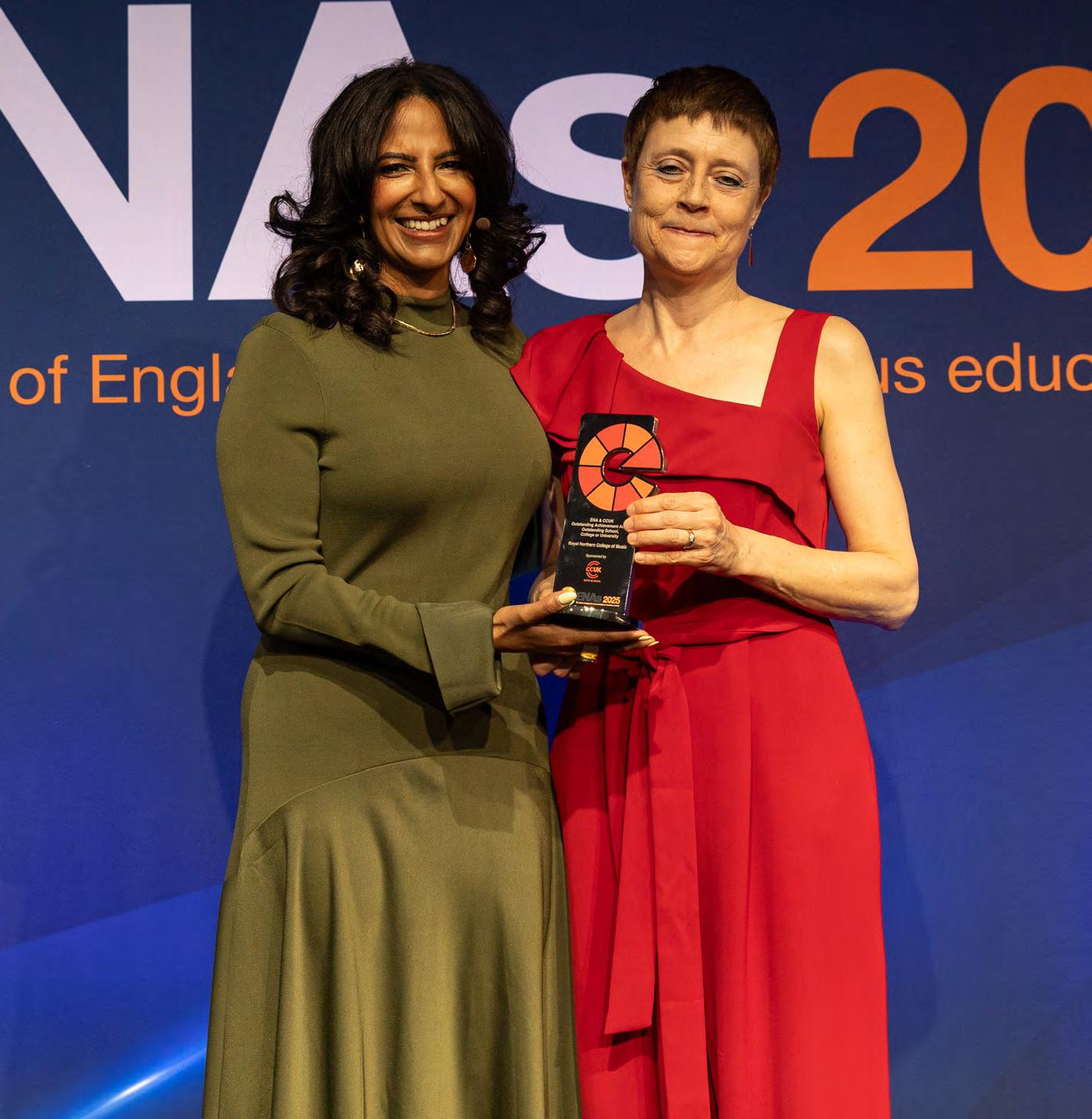

News Round-Up
RNCM Celebrates Big Win at ENAs
We are thrilled to share that the RNCM has scooped the special award for ‘Outstanding School, College or University’ at the annual Educate North Awards (ENAs), beating 500 institutions from across the north of England to win the coveted category.
‘To win this award means so much to everyone who works and studies at the RNCM,’ said Professor Linda Merrick CBE, Principal, who accepted the award at a glittering ceremony at Manchester’s Hilton Hotel. ‘The RNCM is a remarkable place, and we are dedicated to offering a stimulating environment in which our students can thrive. To receive an award which recognises our innovative approach to music education and our core values as an institution is a truly special accolade.’
The Future is Green, our year-long programme of public performance and activity focusing on climate change and the RNCM’s environmental impact, was also shortlisted for an ENA in the Sustainable Green Initiative category.
Ranvir Singh and Professor Linda Merrick CBE
RNCM Ranks Top 5 in the World
The RNCM has retained its position as one of the top five universities in the world for music. For the second year running, the RNCM has been placed No 5 for music in the QS World University Subject Rankings.
The 2025 survey of more than 1,700 international institutions also placed the RNCM in the top 10 globally for performing arts.
The QS Rankings analyse 55 individual subjects across five broad subject areas (including Arts and Humanities, Engineering and Technology, and Natural Sciences), positioning institutions and programmes based on academic excellence, employer reputation, scholarly research, sustainability, and impact.
Professor Linda Merrick CBE, Principal, said: ‘We are extremely proud to be in the top five institutions in the world for music and to have retained our position in the QS World University Rankings – a prestigious recognition that affirms our reputation as a world-leading conservatoire. I wish to express my gratitude to the exceptional staff and outstanding students who strive to create an innovative environment that ambitiously drives forward our industry and strives for excellence in everything we do.’
New Partnerships
The RNCM has launched three exclusive creative partnerships to support modern careers in the music industry with English National Opera (ENO), BBC Radio 3, and groundbreaking ensemble Manchester Collective.
The new partnership projects will provide opportunities for students and recent graduates to develop core skills in opera, contemporary performance, and broadcast media.
The ENO Creative Incubator Scheme will support early career artists to write new operas, bringing fresh voices and narratives to the artform. Open from 2026 to Greater Manchester-based recent graduates, the year-long scheme provides mentoring and financial support, plus workshop and performance spaces for artists to compose and present their new work.
Manchester Collective builds on its recent creative residency at the College with the RNCM Manchester Collective Studio, launching this Autumn. The one-year pathway will support postgraduate strings students to take a holistic approach to contemporary performance, including composing new music, and culminate in a public project with Manchester Collective.
A new collaboration with BBC Radio 3 at its base in Audio North, Salford, will demonstrate alternative career paths in classical music by offering studio production and presenting experiences for undergraduate students. Current RNCM alumni at Radio 3 include Tom McKinney and Linton Stephens, while BBC 6 Music’s Stuart Maconie is an Honorary Member.
RNCM/BBC New Generation Artist Fellow Announced
Violist Timothy Ridout is the first RNCM/BBC Radio 3 New Generation Artist Fellow.
The exciting news marks 25 years of the BBC New Generation Artists (NGA) scheme, which Timothy was part of from 2019 to 2022.
Founded in 1999, the BBC NGA initiative is renowned for nurturing and supporting some of the world’s finest young instrumentalists, singers, and ensembles at the start of their international careers.
In his new position, Timothy – who is recognised worldwide for his captivating performances as both a solo and chamber musician – will work with RNCM students throughout the 2025/26 academic year in coaching and mentoring sessions, culminating in a concert as part of our Inspirational Artists series, broadcast on BBC Radio 3.

‘I’m very excited to be the inaugural RNCM/BBC NGA Fellow and looking forward to my visits to Manchester to perform and work closely with the students!’
Timothy Ridout
SJM Concerts’ Funding Boost for RNCM Students
Leading Manchester promoter SJM Concerts has partnered with the RNCM to provide essential bursaries for students on our classical and popular music programmes. The SJM Concerts Bursary is a three-year scheme that will contribute £8,000 a year towards fees and living costs for two RNCM students. The first two recipients are postgraduate composer Claire Cope, and undergraduate pop vocalist Deni Davidescu.
SJM General Manager and Director Katy Grimwood said: ‘SJM Concerts is proud to support RNCM students and to provide them with the opportunity to achieve their goals and successes. SJM has worked with some of the biggest and most diverse names in live music since the company formed in Manchester in the late 1980s – the city has always been an important part of our story, a place where musical talent can grow and thrive. We are excited to work with such a prestigious conservatoire to be part of the journey that the next generation of emerging talent will take.’
RNCM Awarded Leverhulme Trust Grant
We are delighted to share that the RNCM has been granted £648,900 across four years by the Leverhulme Trust to support scholarships for undergraduate study of endangered instruments and our work with under-18s.
The generous figure represents an increase of 25 per cent on the previous award, and the grant will be used to support places for students whose principal instrument is in critical decline (bassoon, double bass, French horn, oboe, trombone, and tuba), as well as provide scholarships for gifted young musicians studying at Junior RNCM and on our innovative RNCM Young Artists pop music training programme.
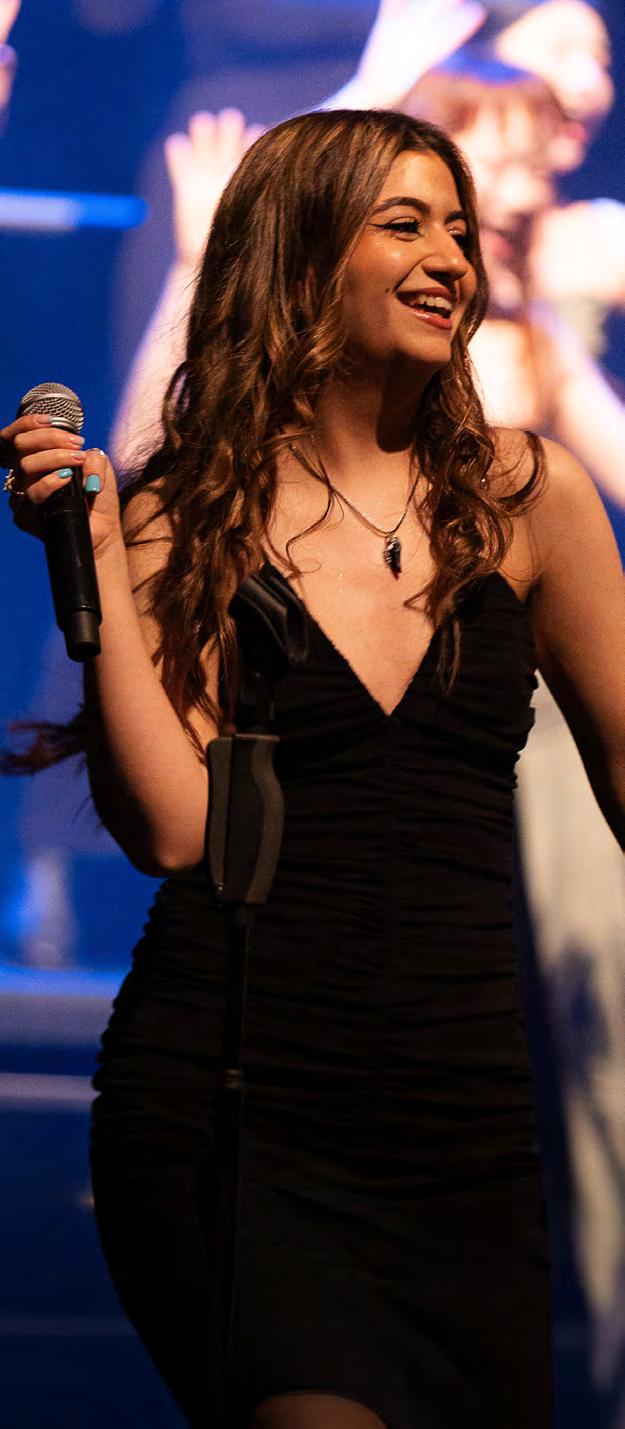
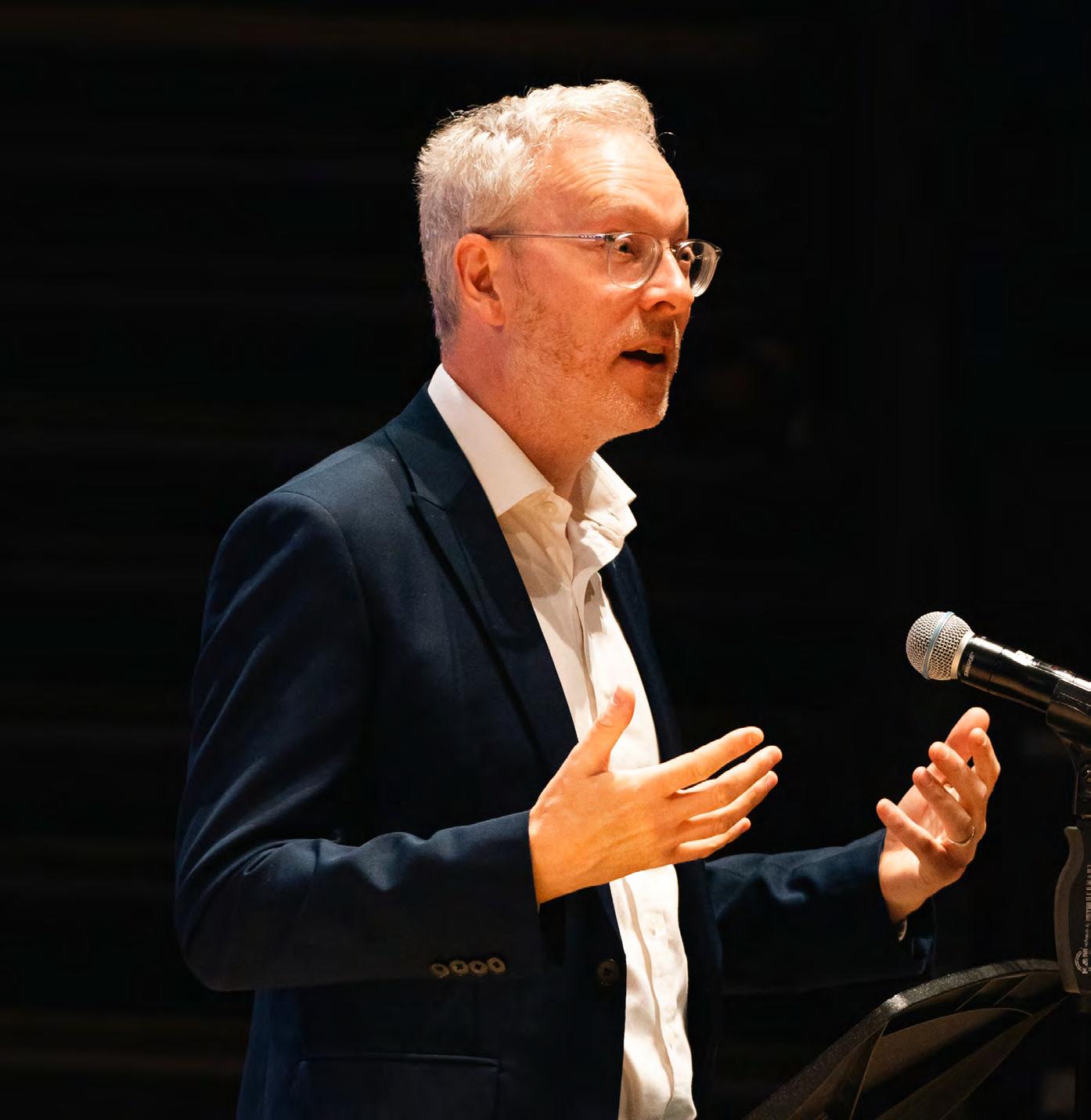
Innovation
is not a Revolution –it’s a constant Evolution
The Royal Northern College of Music has always given its students room to be different, but now the College has made the decision to embed the concept of innovation more deeply across all its activity. RNCM Innovate is about experimentation and discovery, enabling students, staff, alumni, and the organisation as a whole to push the boundaries of traditional music practices and drive the industry of tomorrow. And while it’s not a green light to tear down tradition, says RNCM Deputy Principal (Performance and Programmes) Manus Carey, it is a clear statement that standing still is not an option. He tells Sarah Walters about the RNCM’s plans.
Manus Carey
Nothing is stronger than habit, and no artform’s DNA owes more to tradition than classical music. Generally, conservatoire study has mirrored those conventions, but Deputy Principal Manus Carey believes there’s room to embrace tradition as well as welcome innovation.
‘At the RNCM our students are embedded within a tradition, but we want them to constantly rethink and refresh that tradition. The tradition is the bedrock, and innovation only makes sense in relation to that bedrock,’ says Manus.
‘The world of music is in quite a period of flux and, in many ways, in quite a perilous state. Some of the structures and systems that existed in the past have either gone or are very vulnerable, and so there's a need to produce graduates who can go out and solve the real challenges that exist both in music education and in the music profession.
‘We want our students to not just become fantastic musicians, but to have great ideas about the future of the music world. We’re creating a culture where innovation can happen, where students are bringing through ideas supported by the teaching staff, where we allow them to experiment in the first place, and where students are thinking creatively about how they want to engage with their music.
‘In that atmosphere, anything can happen.’
The landscape of Higher Education is shifting at pace, and music isn’t the only discipline in transition. Student numbers are rising, but the diversity of subjects studied is shrinking – although it’s fair to say that the arts and humanities have taken a bigger hit than many. Innovate is a critical response to that change. Opening pathways to a variety of settings where the impact of music and musicians is palpable –to orchestras and ensembles, of course, but also to healthcare, community initiatives, big tech, climate innovations, wellbeing solutions, and charitable
organisations – illuminates those career possibilities, and being able to offer students an unrivalled number of real-world practical experiences (through professional partnerships and entrepreneurial opportunities) brings those pathways to life.
‘When I came here, from a performance perspective the usual formula was to rehearse something indepth and then perform it to the best of your ability,’ says Manus. ‘It seemed to me that there should be more research and development space to really take risks and do things that might make you feel a bit creatively uncomfortable or stretch you into a different creative experience.
‘Conservatoires should be like labs, not like factories. Our staff and the many guests we bring in are all steeped in this extraordinarily powerful tradition, but they’re also thinking about where it's all going. One of the beautifully exciting things about the RNCM is that we are a public facing space, so we look outward. A critical element of your learning here is doing it in front of a public audience, and I think that's very important because it means you keep up with the changing world that we live in.

‘Manchester is a diverse region of three million people and over 150 languages; we’ve got to get our students thinking about that. How do you get people interested in music that's 150 or 200 years old? You can't just assume they will be. How do you get people interested in new music? We can look at ourselves and ask, “are we relevant – to our community, and the wider world, and what changes do we need to make to ensure we connect with the contemporary world around us?”. These are fundamental questions to answer.’
In-house initiatives, such as RNCM Lab Week, the Innovate Fellow (currently sitarist Jasdeep Singh Degun, who this Summer will perform a collaborative concert of non-Western classical music alongside the students), and the College’s lauded Creative Innovators Award are complemented by external partnerships that signpost the infinite possibilities of a career in music. Cross-genre and cross-artform projects characterise the College’s curriculum and public programme, including with students from the groundbreaking Popular Music department (which still offers the only four-year undergraduate degree of its kind in the UK), and the RNCM boasts an extensive body of postgraduate research that helps to inform and evolve its approach.
The RNCM has a diverse and internationally unrivalled list of close professional partners giving students experience and access to a breadth of pathways into the industry. Longterm relationships with the Hallé and BBC Philharmonic put students side-by-side with professional musicians at every stage of their learning, but the RNCM is forging fresh collaborations that consider those futures even beyond a student’s time with the College. Innovative schemes that genuinely look to the future are being announced with Manchester Collective, English National Opera, Manchester Camerata, BBC Radio 3, and the City of London Sinfonia; enrolled students as well as recent alumni and locally-based early career artists are all set to benefit.
'In some ways,' says Manus, 'Innovate harks back to an even older tradition – to a time when musicians were multitasking composers, conductors, multi-
instrumentalists, and entrepreneurs. Understanding that tradition is the only way to have a meaningful conversation about innovation in the future, and the evidence of that approach is in the careers and projects RNCM alumni have gone on to create: groundbreaking ensembles Manchester Collective, Untold Orchestra, and Kantos Chamber Choir; generations of pioneering composers including Elgar Howarth, Simon Holt, and Emily Howard; soloists and performers with a truly different take, including Abel Selaocoe, Delia Stevens, Alice Zawadski, Alexandra Dariescu, and Vulva Voce; and entrepreneurial trailblazers like Jo Yee Cheung, founder of the charity Olympias Music Foundation.'
Training students to play a principal instrument in an orchestra, then, still requires a world-leading education in the same fundamental skills ‘but the demands on musicians are also very different now’, Manus continues. ‘Some of those are very tangible, like being able to improvise, but others are more intangible – like your mindset, creativity and flexibility – giving you the ability to forge your own career path.
‘The kind of musicians and innovations that have started growing out of here reflect the values that we hold, and how that infuses the music making. What’s interesting is, because of the nature of funding cuts to music education, we're not in as comfortable position as maybe Europe has been, therefore innovation has had to happen. But even within the UK, I think the RNCM is quite far ahead; we've strategically made the decision to focus on where we want to be rather than just preserving where we are. Preservation is a riskier approach to adopt than innovation; that said, this is not a revolution – it’s a constant evolution.
‘Ultimately, at the heart of music is communication between different people, and if you're not keeping up with the world as it changes and diversifies, how are your graduates going to go out and earn a living or really engage in a meaningful way with the world around them?’

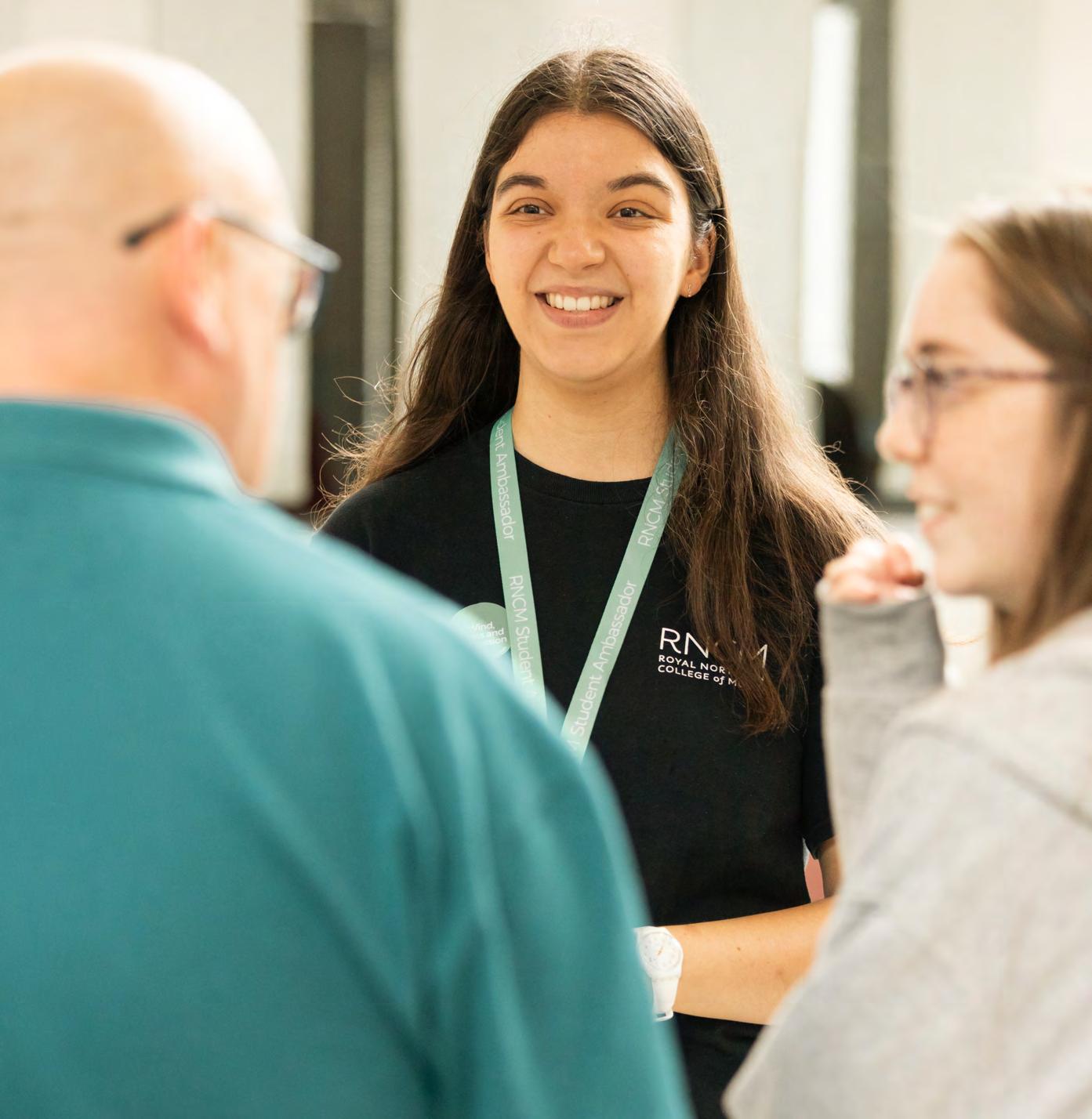




IN TUNE WITH MARIANNE BAILEY
Marianne Bailey has been tuning priceless pianos for close to 40 years and has spent around 13 of those years working with the RNCM’s unique 132-strong fleet of Steinways, Yamahas, and even a Bösendorfer 214VC Grand. She told Sarah Walters how a chance encounter in childhood turned into a fascinating career.
Q: Tell me where your relationship with the piano began?
The thing I was best at when I was at school was music and piano playing, but I knew I was never dedicated or focused enough to make that my career. We had a piano at home and I found it very interesting when the piano tuner came to the house; there was something that hypnotised me about it – not so much the tuning but the science and maths of it.
I went to the London College of Furniture and did a course in piano tuning. I started out as a domestic piano tuner in people's houses, and I also worked at a local piano shop doing their customers' pianos as well as the ones in the shop. Gradually, I got more and more interested in doing concert work; I got involved in Ribble Valley International Piano Week, where Yamaha recruited me into what was the Yamaha Piano Technicians Guild.
Q: What brought you to the RNCM?
Q: Does a piano tuner have to be both musical and mathematical?
Through the Yamaha Piano Technicians Guild, I came here to tune at the James Mottram International Piano Competition in November 2012. The leasing company that owned the RNCM fleet at the time was finding it a challenge to keep a team in place and so kept offering me ridiculous amounts to come and do the job! In those days, a tuner would be contracted to work 90 days a year, and I kept saying, ‘No, no, I can't do that. I don't live near enough and I've got a full-time business’. But I couldn’t stop thinking about all these lovely pianos and how the RNCM would be a lovely environment to work in.
When I first started, there were two of us: myself as head technician, and Dan Carney, who had just trained. He works with the BBC Philharmonic and Bridgewater Hall now – he’s doing all the big venues – but he also still works here. More recently, in 2021, we extended the team to three; one of the SKS (School of Keyboard Studies) students here, Wyn Chan, kept pestering me and I agreed to teach him a bit to see if he’d got any aptitude for it. He came one day a month for a full day of tuning, and it turned out that he's absolutely brilliant; he has an odd combination of great musicianship and a really good ear, but he has also started training as an architect so he has an engineering dimension, too.
Obviously, musical ability helps, and I tune by ear. But there is a lot of maths that goes into what we call equal temperament, which is the division of the 12 nodes of the scale with equal gaps between them, because (and I won't get too technical) they don't fit – you have to have a little bit of compromise between every note, and so the way that we do that is really very mathematical. We're listening to the interactions of harmonics. Every piano is different and produces slightly different harmonics; I'm probably old fashioned, but these days there are digital tuning devices with a meter that works out what's best for that piano, but when you tune by ear you automatically understand what you’re listening for and what you’re hearing, and that means you pick up anomalies and slight variations that a digital tuner wouldn’t pick up.
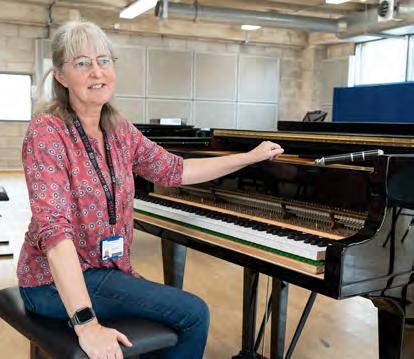
Q: What’s so special about the RNCM fleet of pianos?
Each piano has its own personality. Something like a Steinway is made of natural materials, so you hear in that instrument the story of how the wood grew, how much sunshine there was on that tree, as well as the skill of the craftspeople who put it together. The variation in pianos is incredible. In 2017, I was fortunate to visit Hamburg for a week and go around the Steinway factory, and to have tuition from one of their top concert technicians. That was amazing; this guy went round and tapped the pianos in a very specific place, and he got to one, tapped it, and said: ‘That's going to be a fantastic piano.’ In 2020/21 when we got four Steinway Bs at once, all brand new, the sound of them was very different and they suggested their own locations around the College. The Bösendorfer is very different again; the action has a real immediacy and people who play jazz and more contemporary music prefer it.
Partly the sheer number of them, which is 132 pianos; 53 of them are Steinways, we have one seven-foot Bösendorfer, and the rest are Yamahas. Mostly, though, it’s the good cross section of ages of those pianos; there's no point in having 50 Steinways appearing all at once because they'll all age at the same time – and then you've got a big problem 10 years down the line because you've got to refurbish or replace them. Our oldest piano is from 1985/86 and the newest is a batch of four we acquired in 2020/21. That gives us a big range of ages – and I know that can be a contentious subject because some people consider that pianos made 100-years ago are in some ways superior. But the practicalities of keeping the fleet going means it's very difficult if you've got pianos that aren’t as resilient or robust because the wood has become brittle.
Yet, the cost of leasing them is going to go through the roof because of rising interest rates and other world factors. That also means the value of pianos has gone up as well, especially Steinways, so replacing them with new instruments is getting more and more expensive. It’s just uneconomical to continue leasing, and I’m pleased an arrangement has been negotiated to retain the full fleet.
Q: Tell me about the work you do at the RNCM and what goes into maintaining these instruments?
When I started as a fairly experienced tutor with 30 years of graft under my belt, I had no clue what was going to be facing me when I took this on – it's never ending! They get pounded for 14, 15 hours a day because they’re in constant use – and not just by the SKS students. If you imagine a domestic piano, even a concert pianist wouldn't get more than three or four hours a day of use from it, but here it's just one after another student

Q: Do you work with the students to pass on your expertise?
using it – a constant cycle, and virtually every day of the year. So, they do get a lot of wear and tear.
Tuning is the tip of the iceberg, really, and that aspect of the job is like painting the Forth Bridge! But a lot of my job is less about tuning and more about making sure that the mechanical and operational side of the pianos is going to keep functioning, stripping everything down, checking for faults, defects, and emerging problems.
What doesn’t happen every day is we have guest artists in our concert venues. I’ll prepare two pianos for them, and they will select one for their performance – depending on which one suits their programme and style of playing best. Then I’ll work with them after rehearsal and in the interval to maintain that playing standard. It's always interesting because I have a competition with myself to see which piano I think they're going to choose, and sometimes their choice surprises me. I have my favourite, of course: the 002, which came to us in 2016 and just has the most glorious sound.
I run a class here called Workings of the Piano for undergraduates, which is something that was initiated when I came in 12 years ago. All the undergraduate SKS students get four sessions with me at which we talk about various aspects of pianos and what to look for if you're buying a piano. It’s quite a useful bit of background and it gives me an opportunity to educate them about things, like not putting drinks on them and not dropping their pencil into them! It gives the students a bit more language to communicate with whatever technician they're encountering when they need to address any issues about the way a piano is working. I also do a piano safety course for porters and backstage staff who’ve got to move around these half a ton, unwieldy pieces of equipment. Pianos are a bit like a supermarket trolley – they never go where you’d think!
Would you like to be part of an exclusive chance to purchase an RNCM piano and leave a lasting legacy?
Pianos are at the heart of everything we do - from our youngest Junior School students to postgraduates on the cusp of professional careers.
Currently, we lease our 132-piano fleet at a cost of £480,000 a year, but with the generous help of our incredible supporters, will buy them outright in July 2025.
Can you help us reach our target?
We have hit the £1 million fundraising milestone but seek to raise as much as we can from philanthropic support, with the balance being financed. You can support and ‘name’ a piano from £5,000. If you’d like to support this vital project or know someone who might, you can find out more here rncm.ac.uk/pianocampaign, or contact Eve Riley, Head of Philanthropy: eve.riley@rncm.ac.uk | 0161 907 5338
Northern HIGHLIGHTS
Orchestras of Auschwitz: The Lost Music
For over seven years, composition and conducting alumnus Leo Geyer has worked closely with the Auschwitz-Birkenau Memorial and Museum, to uncover the hidden history of the prisoner orchestras of Auschwitz.
Music was a haunting constant in Auschwitz, from the forced-march melodies to the cryptic compositions written in secret. During this extraordinary collaboration, Leo discovered scorched and torn musical scores – 210 incomplete pieces. With painstaking care, he has pieced them together, decoded the fragments left behind, and strived to restore what remains.
Leo’s journey with these long-forgotten works has been featured in a Sky Arts documentary The Lost Music of Auschwitz, and BBC Radio 4 Artworks recently broadcast a programme exploring what music can reveal about the Holocaust experience and legacy.
This Summer, Leo and his company Constella will bring these fragments to life in an 80-minute Opera-Ballet: a powerful tribute to the musicians silenced by the Holocaust.

Leo Geyer
School of Wind, Brass, Percussion
Alumna takes on Top Role
Saxophone alumna Jude Anderson (2004) has been appointed Chief Executive of Live Music Now Scotland. Jude takes with her to the role extensive leadership experience in both music and the wider arts sectors, with a proven track record of managing charitable organisations and working collaboratively to achieve social impact through the arts.
Remembering her time at the College, Jude said: ‘I’m thrilled to be at the helm of such a brilliant organisation. It was during my time at the RNCM that I first started asking questions and getting curious about arts administration, knocking on doors of the Artistic Planning and Orchestra Management staff and asking to get involved.’
Full Circle: Jennifer Langridge
Alumna Jennifer Langridge has come full circle in her RNCM journey, as she takes on the role of Head of Strings Chamber Music.
Principal Cellist of the Northern Chamber Orchestra, Jennifer studied at the RNCM before taking up the position of Junior Fellow as part of the Nossek String Quartet. For 30 years, she has enjoyed a distinguished career as Principal Cello of Psappha Ensemble, founder member of Victoria String Quartet, member of the BBC Philharmonic, and Guest Principal with orchestras including Opera North, Manchester Camerata, and the Royal Northern Sinfonia.
Jennifer said of the appointment: ‘It’s a great honour and a big responsibility to take on this role. It is particularly poignant for me as I began my career here in the 1990s with the Nossek String Quartet, under the guidance of Dr Christopher Rowland. There is a long-held legacy at the RNCM of producing extremely fine chamber musicians and I’ll be thrilled to play my part in continuing that tradition.
‘Chamber music is the lifeblood of string players; I hope to keep enthusiasm high, fostering the deep joy of making music together.’



Congratulations to
• Stefan Ragnar Hoskuldsson (1997) on his appointment as Principal Flute with the Berlin Philharmonic.
• Conductor Alpesh Chauhan OBE (2014), signed to Askonas Holt for general management.
• Vulva Voce (Georgina MacDonell Finlayson, Nadia Eskandari, Julia Sandros-Alper, Lucy McLuckie) on the release of their debut EP Maddalena
• Opera alumni Jessica Hopkins (2024), contracted to join the opera studio at Opera National du Rhin (Strasbourg); Chelsea Burns (2018), selected for the Opera Australia Young Artists Programme 2025/26; and baritone Emyr Lloyd Jones (2020), who will join the Jette Parker Young Artist Programme for the 2025/26 season.
• Paige Kennedy (2021) featured in The NME 100 Essential Emerging Artists 2025.
• Violinist Callum Smart (2019) appointed as Assistant Professor of Violin at the Carnegie Mellon University School of Music.
• Helene Mathiesen (2020), producer of The Hive Opera, awarded an Arts Council Project Grant to produce a fully staged production in collaboration with the Royal Liverpool Philharmonic Orchestra.
• Brass alumni Sam Jacobs (2008) appointed Principal Horn with Sydney Symphony Orchestra; and Liz (Wizz) Bannan (2015), appointed Principal Trombone No 2 with Ulster Orchestra.
• Composers Phoenix Rousiamanis (2019) and Emily Pedersen (2024) interviewed for Prxludes magazine.
• Pop alumnus Gavin Adams (2021) joining the cast of Starlight Express London as Rusty.
Contact alumni@rncm.ac.uk to keep us up to date with news of your career successes.
Paige Kennedy
Alpesh Chauhan OBE
Jessica Hopkins
Where are they Now? RNCM Wind Orchestra
2025 marks 30 years since the RNCM Wind Orchestra’s tour to Japan, and in this edition of Where are they Now?, we’re celebrating with a look back at their concerts, tours, and performances over the years. We even uncovered a 1995 review of the Gala Concert, where conductors Tim Reynish and Sachio Fujioka wore traditional dress to honour the Orchestra’s Japan tour.




Were you part of that tour, or do you spot familiar faces in the photos?
Whether your memories are from 30 years ago or just three years ago, we’d love to hear from you! Share your stories or photos at alumni@rncm.ac.uk or visit rncmconnect.com/photos-albums
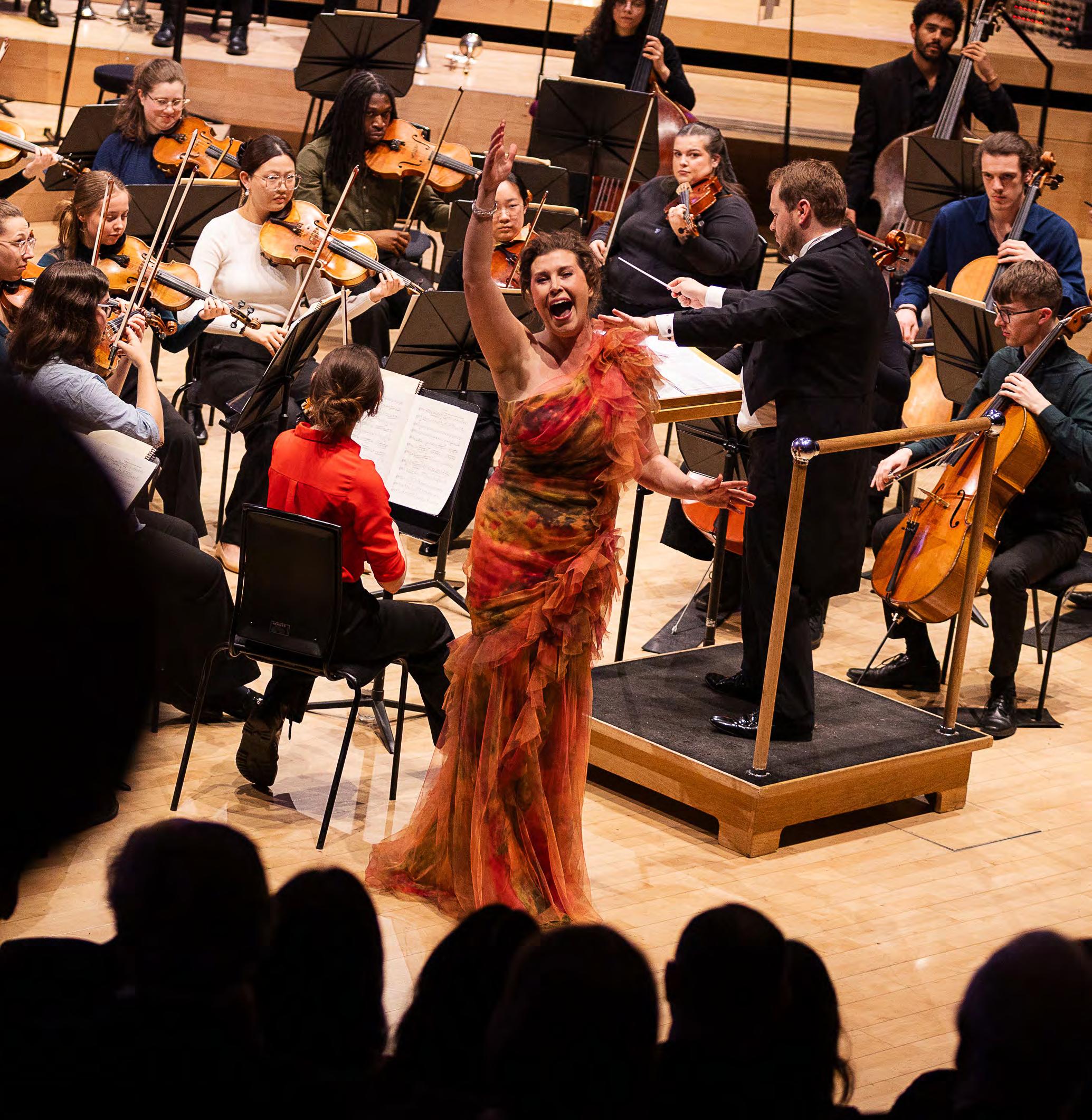
An Inspiring Year in Development
We’ve had a truly inspiring year in the RNCM Development Team, filled with community, creativity, and support. Whether it’s been a gift, a campaign, a kind donation, or a shared memory, every moment has shown the amazing impact our community and students have on each other.
From reconnecting with old friends to welcoming new supporters, we’ve had many uplifting moments that remind us why we do what we do. Here’s a look back at some of the highlights from a busy year.
APRIL 2024
JUNE 2024
SEPTEMBER 2024
The RNCM partnered with Farewill, offering students, staff, and alumni a free will-writing service. Gifts in will remain hugely important to the RNCM.
We hosted a special dinner with RNCM alumnus and International Chair in Piano, Sir Stephen Hough, to launch our Piano Campaign, raising funds to purchase the RNCM’s valuable fleet of pianos, which are currently leased.
Thanks to a generous five-year grant from the Benny Walker Charitable Trust, we ran the second year of RNCM Engage West Cumbria. The project aims to boost the provision of music education in the area for under 18s, with RNCM students playing a key part as tutors and role models.
NOVEMBER 2024
NOVEMBER 2024
A Desert Island Discs-style evening with Dame Ann Murray DBE and Lynne Dawson (Head of School of Vocal and Opera Studies) launched the new RNCM Opera Circle, bringing together opera lovers keen to support the next generation of talent by investing in our productions.
We launched our Annual Appeal, raising over £40,000 to boost the RNCM’s Access to Learning Fund, a lifeline for students experiencing financial hardship. Funds raised established a new virtual food larder and a new opportunity fund for students most in need, removing financial barriers so they can take part in valuable artistic enrichment projects.
JANUARY 2025
FEBRUARY 2025
MARCH 2025
MARCH 2025
The John Wilson Piano Spectacular saw eight esteemed internationally renowned pianists, directed by Tim Reynish, come together to raise funds for the John Wilson Fellowship in Accompaniment.
Our fifth fundraising appeal for the annual Williams-Howard Prize, established by RNCM Professor of Singing, the late Michael Harper, to promote the study and performance of arts song by composers of the African diaspora. We reached our fundraising goal allowing the award to be endowed and continue Michael’s legacy.
We closed a two-year project, Throwing Open The Concert Hall Doors, made possible by the National Lottery Heritage Fund. The initiative explored the RNCM Archive and saw 2,127 audio reels of RNCM performances over the years professionally conserved and digitised and 58 community sessions delivered.
We hosted a Fundraising Gala, raising £50,000 of vital funds to break down barriers to music education. The evening included a three-course dinner and a musical journey across the RNCM, including a performance from alumna and soprano Alexandra Lowe and RNCM Honorary Member Tim Burgess.



An Evening with Dame Ann Murray
Piano Campaign dinner
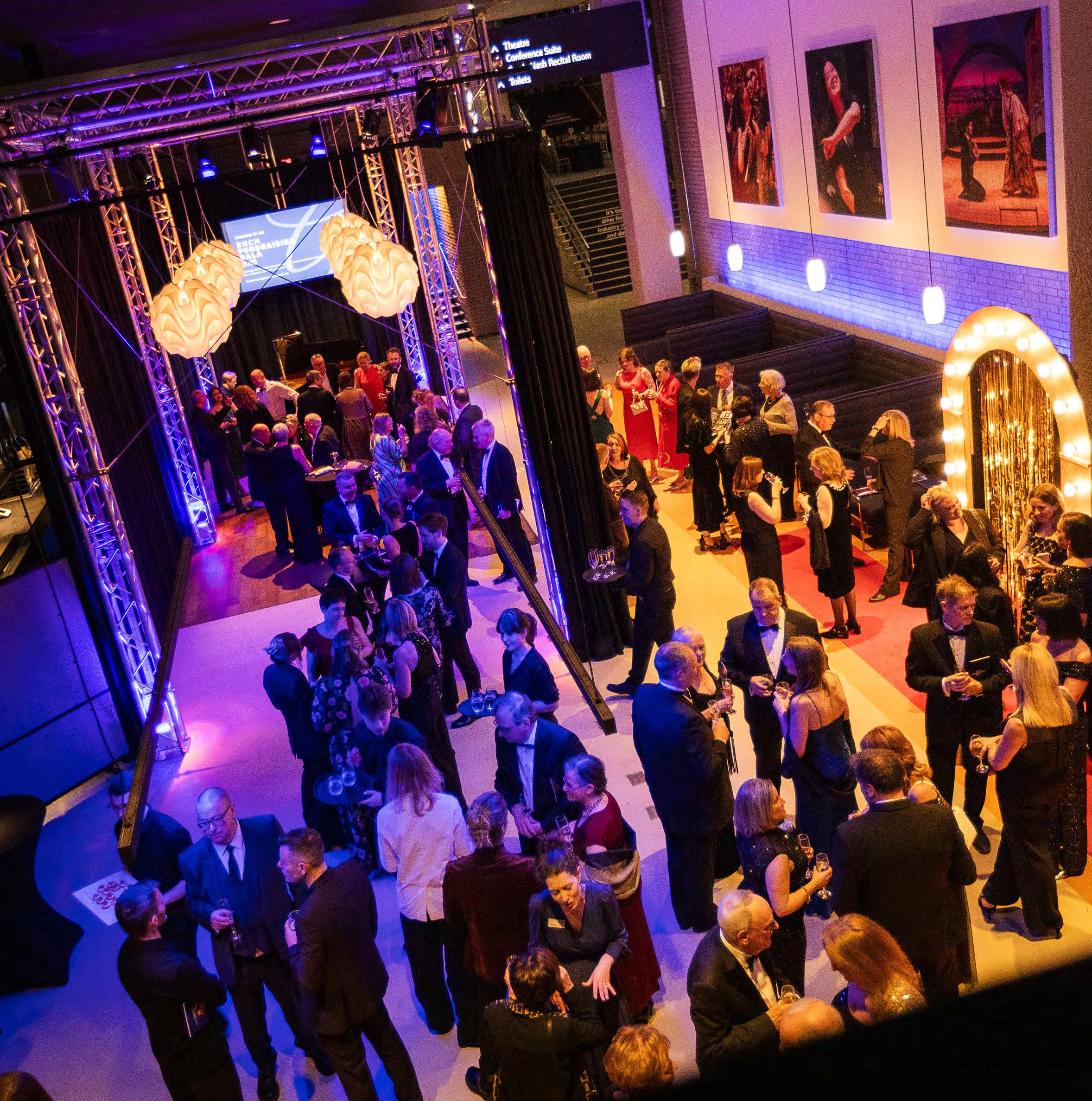
Costumes &Props
In a recent Q&A, alumnus Mark Burns (Voice, 2011)who returned to direct the RNCM’s December opera L’étoilerevealed that some of the costumes were repurposed from past productions, including his own from Katya Kabanová in 2009!
So, we thought we’d dive into the archives to share photos of props, costumes, and sets from past performances. How many do you recognise - and how many have had a second (or third!) life on stage?
Have you got your own prop stories - triumphs or disastersfrom your student days? We’d love to hear them! Let us know at alumni@rncm.ac.uk or share on our social media @rncmlive
You can see more behind the scenes photos and read Mark’s full interview on rncmconnect.com



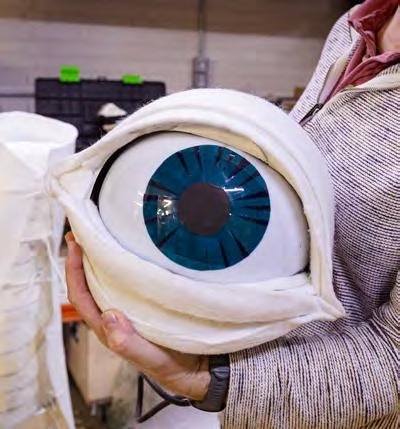


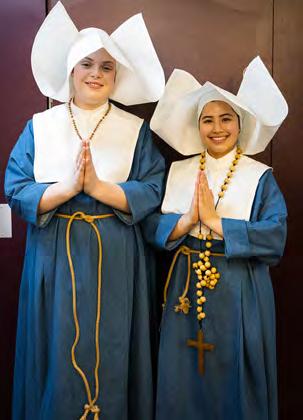

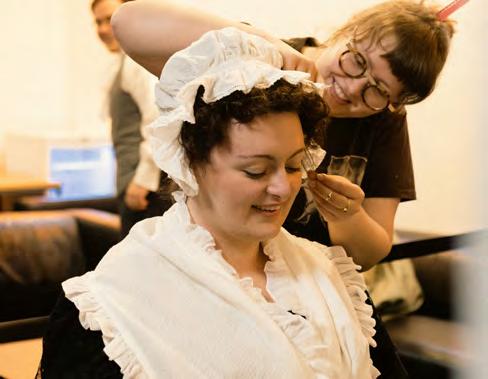

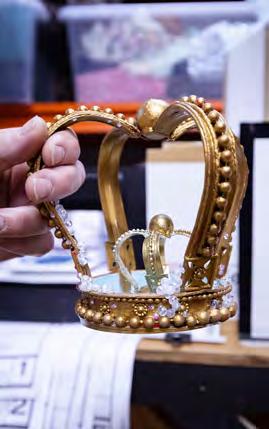
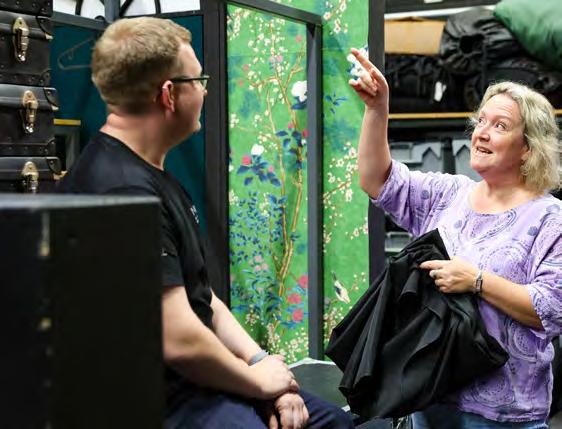
RNCMOPERA CIRCLE :
Why do we need Opera, anyway?

By Professor Lynne Dawson, Head of School of Vocal Studies and Opera
I am still somewhat baffled that I’ve spent my working life as a professional musician; it seems to have come about by happenstance. I trained not in music, but in modern languages and spent five years in industry as a translator and interpreter. Those years were to stand me in excellent stead as a singer. I loved to sing and finally could not resist leaving that first employment in order to commence studies as an undergraduate in a conservatoire.
Mansfield Park

I very soon left those studies as, due to the recommendation of my first teacher, who was indeed a member of staff at the RNCM, I was rather catapulted into professional work by being asked to join a very long-established vocal ensemble, with whom I then sang for nearly four years. It was they who taught me to be a musician. One learns quickly to collect information from every colleague and, from very early, I was hugely fortunate to work with some wonderful musicians: singers, instrumentalists, conductors, accompanists, coaches, directors. The conductors with whom I worked, over many years, included Barenboim, Mehta, Giulini, Hogwood, Pinnock, Rattle.
Opera came to me after consort and concert singing, and recordings of both opera and oratorio concert repertoire, with many major labels and orchestras. How can one possibly learn so quickly to multitask on stage without prior training – how to rehearse, to react, to listen and be in time at a distance, how to enter the stage, walk, kneel, use the space, not upstage others on stage, use distance as tension, project, understand what is required at every level, when everything one sings is new repertoire. It was
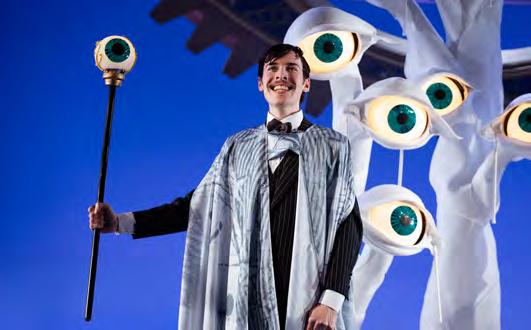
a very quick learning curve, and I was fortunate to work with some wonderful, and patient, directors. The directors of the first two productions in which I was involved were Colin Graham and Sir Nicholas Hytner.
Perhaps not having had the benefit of the training makes one super aware of how to prepare young singers for the profession.
As tutors, many of whom have had long performing and teaching careers, we are very aware that the students are often looking at repertoire for the first time and our combined programme of voice and opera is specifically designed to give them the skills they need to develop into competent and confident performers. They need excellent technical, language and performance skills, imagination, experience on stage, first-rate musicianship skills, in order to succeed.
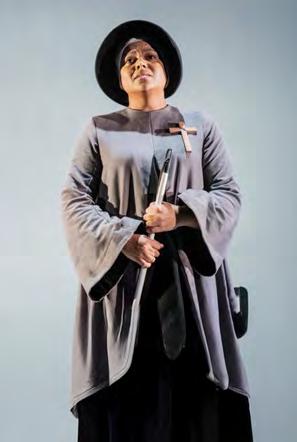
At the RNCM, we have an extraordinary tradition to uphold; the School has decades of successful alumni, singers who have entered the profession and had, and currently have, international careers. This has not ceased in the latest decades, and we have alumni singing throughout the world as international soloists and choristers.
Singing in opera is of course not natural; in many ways the singer’s training is similar to that of an athlete –how, for instance, do the singers possibly produce such volume without a microphone? It may take quite a long time to train a singer; there is natural maturity and development, and there is a recognised ‘system’ of training. Of the students, it requires huge commitment, drive, energy, generosity, integrity.
Dialogues
At the RNCM, in addition to a curriculum which includes movement, physicalisation, stagecraft, we programme opera scenes and two fully staged operas with orchestra, double cast, every year. One can’t simply describe how to be an effective singing actor; the students need the experience of doing it.
Why do we need opera, anyway? Perhaps the Arts have been, and are, the way of bringing emotion into all matters which are challenging: political, social, societal, nowadays around climate change, and so on – all areas about which our students care enormously. Opera today is experiencing an interesting evolution and growth as a generation of musicians, composers, and writers bring through new stories, new voices, and a fresh perspective on operatic narratives and music, drawing renewed interest in its possibilities and purpose.
In opera, there is the combination of many art forms – music, theatre, acting, design, declamation, rhetoric – and opera isn’t a completely straightforward sport; it has been described as ‘life amplified’ and it can
easily take 10 years of study and experience for a young artist to enjoy resilience and confidence in their skills. Even if, eventually, our young singers and instrumentalists may not decide to follow full-time operatic careers, the skills they will have learned will enable them to flourish in many careers.
I feel enormously fortunate to have been able to work as a professional musician for most of my life, and privileged to be part of the journey our students will experience as they discover their own future career paths.
Financial support through the Opera Circle enables us not only the possibility to continue this exceptional training, but it gives the students confidence that we care that their musical ambitions are cherished and respected. With that confidence, they may just be able to fly.
To find out more about the Opera Circle, visit: rncm.link/rncm-opera-circle

Prayer of a Peacock
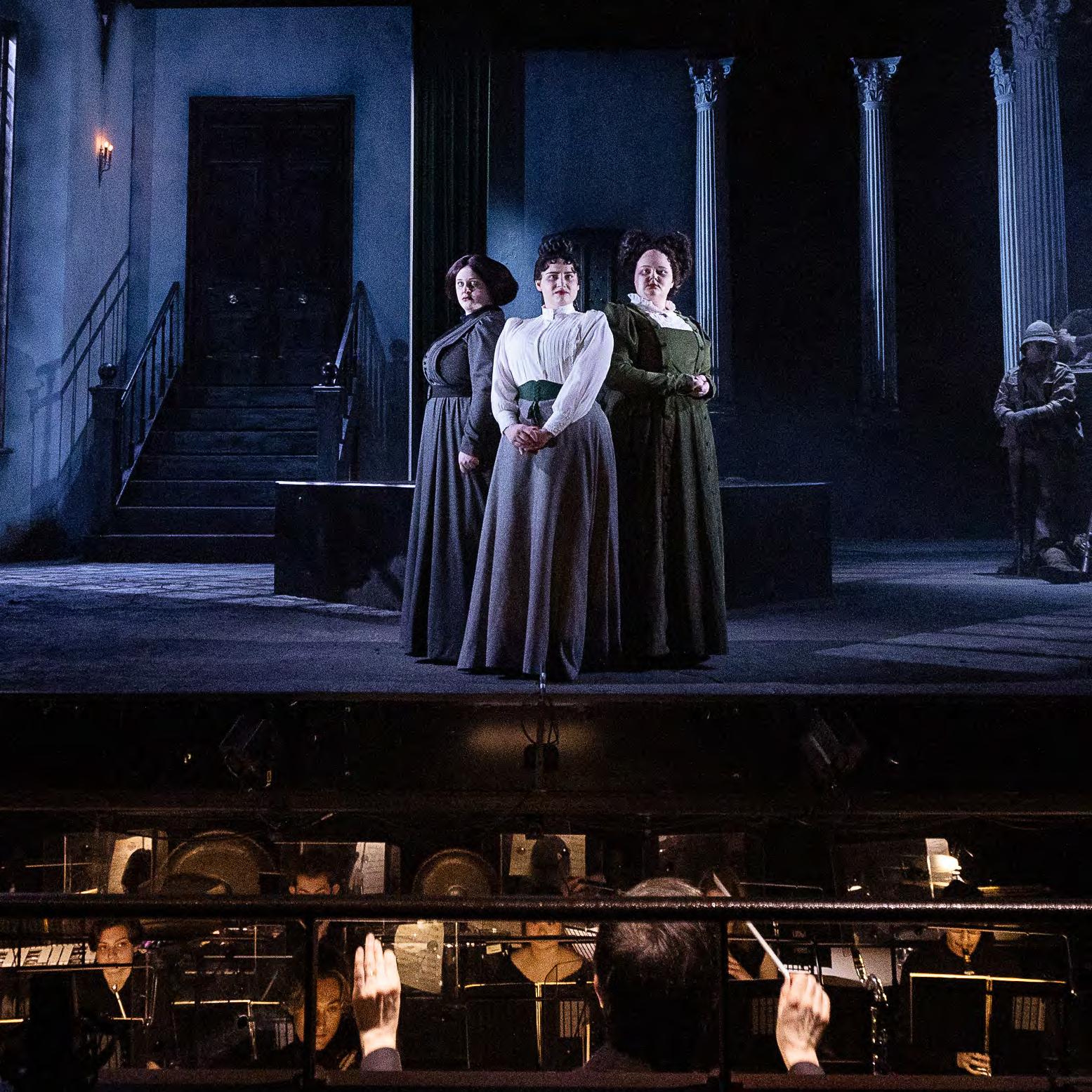
Owen Wingrave



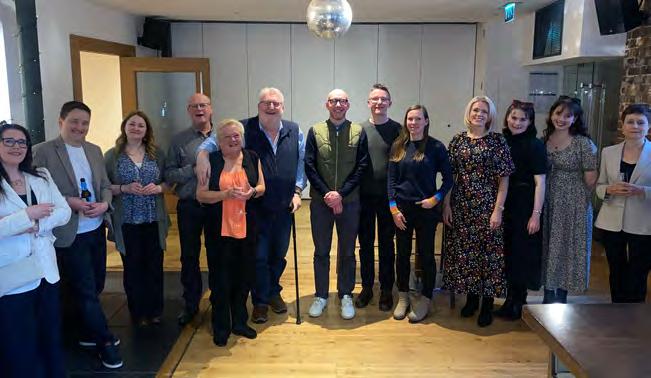
It’s been a fantastic year of reconnecting with RNCM graduates –across the UK and around the world. From Liverpool to Hong Kong, Glasgow to China, London to the USA and Canada, and of course, some unforgettable moments here in Manchester too, we’ve loved catching up with so many of you.
To stay updated about future events make sure you’re signed up to RNCM Connect: alumni@rncm.ac.uk | rncmconnect.com
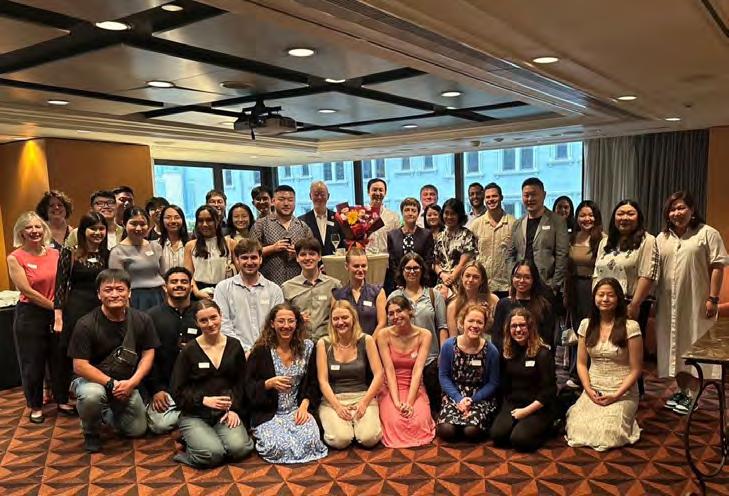
China
Cardiff
Liverpool
Glasgow
